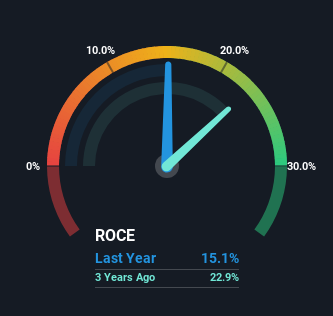Capital Allocation Trends At Royal Unibrew (CPH:RBREW) Aren't Ideal
Finding a business that has the potential to grow substantially is not easy, but it is possible if we look at a few key financial metrics. One common approach is to try and find a company with returns on capital employed (ROCE) that are increasing, in conjunction with a growing amount of capital employed. Ultimately, this demonstrates that it's a business that is reinvesting profits at increasing rates of return. However, after investigating Royal Unibrew (CPH:RBREW), we don't think it's current trends fit the mold of a multi-bagger.
Return On Capital Employed (ROCE): What Is It?
If you haven't worked with ROCE before, it measures the 'return' (pre-tax profit) a company generates from capital employed in its business. To calculate this metric for Royal Unibrew, this is the formula:
Return on Capital Employed = Earnings Before Interest and Tax (EBIT) ÷ (Total Assets - Current Liabilities)
0.15 = kr.1.5b ÷ (kr.15b - kr.5.0b) (Based on the trailing twelve months to June 2023).
Therefore, Royal Unibrew has an ROCE of 15%. In absolute terms, that's a satisfactory return, but compared to the Beverage industry average of 9.7% it's much better.
View our latest analysis for Royal Unibrew

Above you can see how the current ROCE for Royal Unibrew compares to its prior returns on capital, but there's only so much you can tell from the past. If you're interested, you can view the analysts predictions in our free report on analyst forecasts for the company.
What Can We Tell From Royal Unibrew's ROCE Trend?
On the surface, the trend of ROCE at Royal Unibrew doesn't inspire confidence. Around five years ago the returns on capital were 26%, but since then they've fallen to 15%. However, given capital employed and revenue have both increased it appears that the business is currently pursuing growth, at the consequence of short term returns. And if the increased capital generates additional returns, the business, and thus shareholders, will benefit in the long run.
The Bottom Line
In summary, despite lower returns in the short term, we're encouraged to see that Royal Unibrew is reinvesting for growth and has higher sales as a result. These trends are starting to be recognized by investors since the stock has delivered a 20% gain to shareholders who've held over the last five years. So this stock may still be an appealing investment opportunity, if other fundamentals prove to be sound.
Royal Unibrew does have some risks though, and we've spotted 3 warning signs for Royal Unibrew that you might be interested in.
While Royal Unibrew isn't earning the highest return, check out this free list of companies that are earning high returns on equity with solid balance sheets.
New: AI Stock Screener & Alerts
Our new AI Stock Screener scans the market every day to uncover opportunities.
• Dividend Powerhouses (3%+ Yield)
• Undervalued Small Caps with Insider Buying
• High growth Tech and AI Companies
Or build your own from over 50 metrics.
Have feedback on this article? Concerned about the content? Get in touch with us directly. Alternatively, email editorial-team (at) simplywallst.com.
This article by Simply Wall St is general in nature. We provide commentary based on historical data and analyst forecasts only using an unbiased methodology and our articles are not intended to be financial advice. It does not constitute a recommendation to buy or sell any stock, and does not take account of your objectives, or your financial situation. We aim to bring you long-term focused analysis driven by fundamental data. Note that our analysis may not factor in the latest price-sensitive company announcements or qualitative material. Simply Wall St has no position in any stocks mentioned.
About CPSE:RBREW
Royal Unibrew
Provides beer, soft drinks, malt beverages, energy drinks, cider/ready to drink, juice, water, and wine and spirits.
Solid track record, good value and pays a dividend.
Similar Companies
Market Insights
Community Narratives



